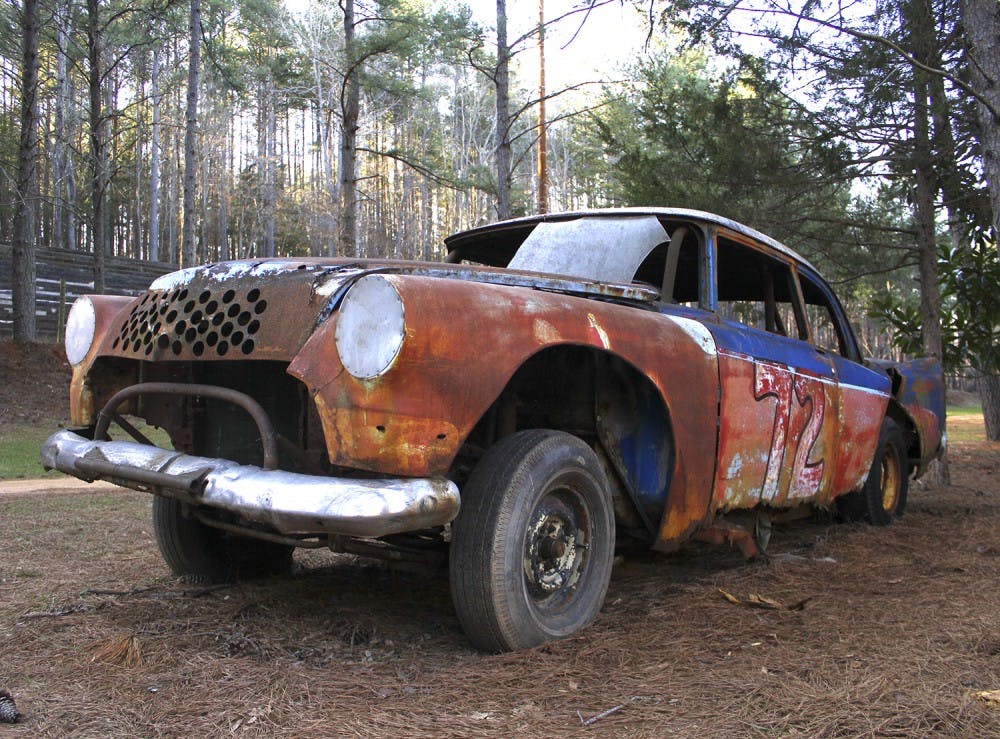The early days
The track was conceived in 1947 by Bill France Sr., the co-founder of NASCAR, who spotted an old horse track during a flyover of Orange County.
The property was previously owned by Carrboro’s namesake, Julian Carr.
The mile-oval dirt track held its first race on June 27, 1948, with Fonty Flock taking the checkered flag.
The race, NASCAR’s third ever, was a crucial test for France and the sport.
“Would they have had cup racing without that race? Probably not,” said Bill Blair Jr., High Point native and son of former driver Bill Blair Sr.
Bill Blair Jr., raced at Occoneechee 10 times between 1949 and 1958.
When France saw the support the first race at Occoneechee received, Bill Blair Jr. said he knew he was onto something.
By 1950, there were 15,000 spectators coming to races, paying $2 for infield seats and $3 for the grandstands.
“Some races had overflow crowds, probably closer to 19,000,” Bill Blair Jr., said. He said he watched his first race at Occoneechee Speedway in 1949 at age 10.
“People were spilling onto the track, and some races had to be delayed.”
Bill Blair Sr., born in 1911, was one of seven boys and had a rebellious spirit even as a young man.
To get the day's news and headlines in your inbox each morning, sign up for our email newsletters.
“My dad use to haul moonshine,” Bill Blair Jr., said. “Moonshiners were celebrities back then.”
On Christmas Eve in 1932, Bill Blair Sr., was caught in Martinsville, Va., with 125 gallons of moonshine in his car.
That charge would usually require jail time, but he got off with paying a $100 fine thanks to his politician father, John Blair, according to Bill Blair Jr.
Around this time, Bill Blair Sr., began racing.
During World War II, Bill Blair Sr., moved his family up to Baltimore, where he built battleships.
After the war was over, he moved back to North Carolina and continued racing.
Looking back on those early days, Bill Blair Jr., admits it was a different time.
"(The drivers) loved to race,” he said. “They sacrificed, and some went to prison just to race. They had a different spirit.”
The anti-racers
While many enjoyed watching races on Sundays, some locals worried about the environment these races created and who they were attracting.
In 1956, the Rev. W.I. Conway started the Orange County Anti-Racing Association with the ultimate goal of banning racing on Sundays.
With the help of fellow minister Charles Maddry and state Senators Edwin S. Lanier and John W. Umstead, a bill was passed by the state senate in 1957 officially banning racing on Sundays in Orange County.
But local police were slow to enforce the new law and racing continued for another decade.
“I started going to races in 1957 when I was 5,” Craig said.
“My dad, the prison warden of Hillsborough and the sheriff would do security for the races.”
There was even talk of paving and expanding the track.
“When France tried to extend the track, that’s when they really fought him,” Craig said.
Due to mounting pressure from local clergies, Occoneechee finally closed in 1968, with a young Richard Petty winning the track’s last official race.
Finally defeated, France left and began work on a new super speedway in Alabama which would become Talladega Superspeedway, one of the most iconic raceways in NASCAR.
“I think (closing the track) was a mistake,” Craig said.
“It would have changed the landscape of Hillsborough.”
Still, those responsible for ending racing in Hillsborough might not have regrets.
“In business terms, do they regret the track closing? Absolutely,” said L.D. Russell, author of “Godspeed: Racing is My Religion” and senior lecturer in religious studies at Elon University.
“From a moral standpoint, I don’t think so. They stood by their convictions.”
Yearly events and memorial races at Occoneechee are put on by a volunteer organization called the Historic Speedway Group.
Its 10th annual event at Occoneechee will be held on Oct. 1.
@ryansalch
city@dailytarheel.com




